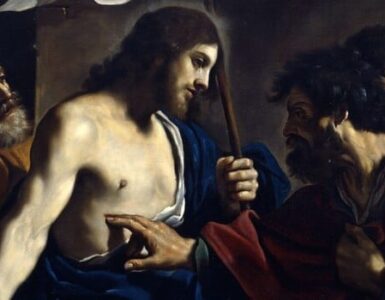(Read Rom 12:9-16; Is 12:2-6; Lk 1:39-56)
During those days Mary set out and traveled to the hill country in haste to a town of Judah…
Let us picture this scene from today’s Gospel: the angel tells Mary that she is the mother of the Messiah, the proof of which is that her aged cousin Elizabeth has miraculously conceived a child as well. Mary gives the angel her “Fiat,” then heads out to tend to her cousin. The thing is…something has happened between the time of Mary’s consent and the time she leaves her home.
While Scripture tells us that Mary traveled “in haste,” we do not hear that she set out “immediately.” We hear that she set out “during those days”—plural. In other words, it wasn’t that the angel departed from her, and then Mary turned around and packed her bags. It was a certain number of “days” before Mary departed.
Why is this significant? Because it tells us that something happened between the time the angel departed, and the time Mary decided to leave. Of course, we can imagine Mary needed some time to get her household affairs in order before going away for an extended stay. She would have needed time as well to pack provisions for the journey, and perhaps to say goodbye to some family and close friends.
Most of all, Mary would have needed time to explain to St. Joseph what was happening to her, to ask his permission to leave, and to discuss how they both were feeling about the events that were transpiring. It would have been the most intimate, loving, and unifying conversation they would have ever had in their lives together as a betrothed couple. It would have been a beautiful moment they would have treasured in their hearts for the rest of their lives.
All of this would have taken some time. But still—if Mary was determined to leave “in haste,” none of this would have been enough to prevent her from departing the very next day. No, there is something more that would have taken place between the time of the angel’s departure and the time Mary departed herself. It is a detail which ultimately explains what took some days for Mary to leave to visit her cousin; what’s more, it explains why Mary then felt compelled to go so quickly:
Behold, you WILL conceive in your womb and bear a son…The holy Spirit WILL come upon you, and the power of the Most High WILL overshadow you…
(Lk 1:31, 35)
It was after the angel departed, but before Mary set out, that she was “overshadowed” by the Holy Spirit. We don’t know exactly when that overshadowing took place; perhaps it didn’t happen for “days” after the angel’s departure. We also don’t know what that could have possibly been like for Mary. We can only imagine. But there is something we can say with certainty.
This overshadowing would have been a deeply personal and intimate experience, and just like the deeply personal and intimate experience of the marital embrace, the rest of us are simply not privy to what took place in the secret, hidden temple of Mary’s heart and home. There was nothing immodest about this overshadowing of the Holy Spirit. Mary remained totally pure and undefiled. She didn’t suddenly “become a woman” or “lose her innocence” in any way. Perhaps Mary’s room was filled with glorious, supernatural light at that moment of Our Lord’s conception. What we do know is that the light of God filled her heart as it filled her womb. How do we know this? By the clues Mary leaves us in her exhortation later to Elizabeth:
My soul proclaims the greatness of the Lord; my spirit rejoices in God my savior… from now on will all ages call me blessed. The Mighty One has done great things for me…
Mary’s soul was now filled with rejoicing and awe. There is something that happened to her personally in that moment as she was overshadowed by the Holy Spirit, and it was not only the conception of the Son of God. In that moment of overshadowing, Mary herself received, utterly to capacity, every gift of the Holy Spirit: wisdom, understanding, counsel, fortitude, knowledge, piety, and fear of the Lord. And it would have been in this disposition of continual and clear exchange of communication between Mary and the Holy Spirit that the Lord would have directed her to go to Elizabeth. So there was no question or objection on Mary’s part. As soon as Mary understood her instructions, she would have then set out and traveled “in haste.”
Behold, I am the handmaid of the Lord. May it be done to me according to your word.
(Lk 1:38)
Mary, on this feast of your visitation to your cousin Elizabeth, please lend us your heart. Teach us to ponder, as you did, the hand of God in our lives. Like you, may we go in haste, the moment we understand and discern the Father’s call for our lives.
Raphael. (1517). The Visitation. [oil on panel]. Retrieved from Museo del Prado.










